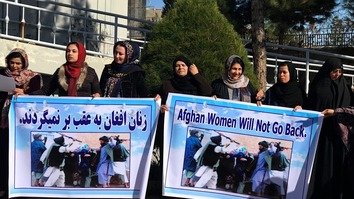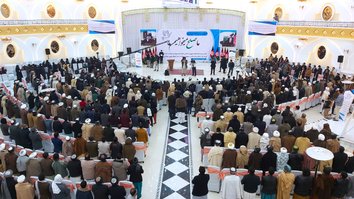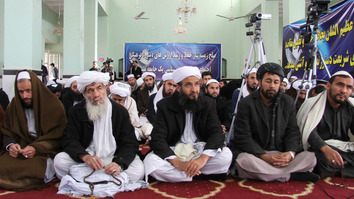HERAT -- More than 500 residents of Herat including religious scholars, government officials, civil society activists and youth gathered on September 11 to protest the Taliban's dishonesty in now-cancelled peace talks with the United States.
A campaign of violence by the Taliban amid the final moments of peace negotiations, aimed at putting pressure on the Afghan government and its international allies, prompted the United States to call off talks.
The Taliban commit violence and kill innocents because they do not believe in peace and are only trying to regain power and re-establish an "Islamic emirate", according to those who attended the rally in Herat city.
The Taliban had been negotiating in bad faith, said Maulawi Sayed Ahmad Akhundzada, a spokesperson for the Religious Scholars Council in the western region of Afghanistan.
"On the one hand, the Taliban were negotiating peace behind closed doors, but on the other hand they were engaged in fighting with the public," he said in an interview.
Fahim Farjam, a resident of Herat city, said the Taliban were using the peace talks as a way to claim legitimacy.
"The peace talks in Qatar proceeded in favour of the Taliban and elevated their expectations," he said. "In recent months, the Taliban had even considered themselves a government and they released statements every day on behalf of the Afghan people. With the cancellation of the peace talks, the Taliban have lost their position before everyone."
Many other observers have come to the same conclusion: that Taliban leaders, due to their own violent actions, are finding themselves in a weakened position following the cancellation of the talks.
The Taliban have shown they cannot be trusted, said Herat Governor Abdul Qayum Rahimi.
"The Taliban have proved for more than 20 years that they don't believe in peace and that their only goal is to gain power," he said.
"We will be conducting the election," he said, referring to the September 28 presidential election. "Our future government will work more passionately on the peace process."
The Taliban's extremist aims
The Taliban cannot be trusted, concurred civil society activists and Herat Province residents.
Referring to the recent Taliban attacks in Kabul and in a number of other cities, they said that the Taliban have shed the blood of many Afghans in an attempt to strengthen their bargaining position in the peace talks, while these terrorist acts show the ignorance of and deception by the militants.
"The demands that the Taliban presented during the peace talks with America weren't their own, but they were rather the demands of the countries that support the Taliban and pursue their goals through them [the Taliban]," said Khalil Ahmad Shaheedzada, a former Wolesi Jirga member from Herat Province.
These countries tried to use the Taliban to put pressure on America and Afghanistan and to benefit from the situation, he added.
"The Taliban's goal in speaking with America wasn't to bring peace to Afghanistan; they thought only about their own interests and the dream of their 'Islamic emirate'," said Ghulam Farooq Raseb, a civil society activist in Herat Province.
"The increase in violence and in killing of civilians and security forces by the Taliban shows that the group doesn't believe in peace and reconciliation," he said.
"The Taliban wanted to reinstate the 'Islamic emirate' in lieu of the current state," Raseb said. "They wanted to enforce their own extreme laws instead of the Afghan constitution, but they didn't succeed."
Afghans have been suspicious of the Taliban's motives throughout the peace talks, agreed Toryalai Taheri, deputy chairman of the Herat provincial council.
"Everyone had worries about the return of the Taliban," he said. "Afghans were very worried that the 'Islamic emirate' would be reinstated in Afghanistan and that the achievements of the two decades -- which have been accomplished with a lot of effort -- would be lost."

![Hundreds of Herat residents, including religious scholars, government officials, civil society activists and youth, gather September 11 to protest the Taliban's dishonesty in now-cancelled peace talks with the United States. [Omar]](/cnmi_st/images/2019/09/18/19954-p_1-585_329.jpg)






